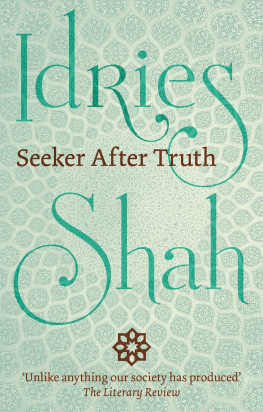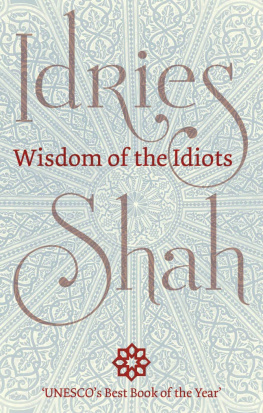Books by Idries Shah
Sufi Studies and Middle Eastern Literature
The Sufis
Caravan of Dreams
The Way of the Sufi
Tales of the Dervishes: Teaching-stories Over a Thousand Years
Sufi Thought and Action
Traditional Psychology,
Teaching Encounters and Narratives
Thinkers of the East: Studies in Experientialism
Wisdom of the Idiots
The Dermis Probe
Learning How to Learn: Psychology and Spirituality in the Sufi Way
Knowing How to Know
The Magic Monastery: Analogical and Action Philosophy
Seeker After Truth
Observations
Evenings with Idries Shah
The Commanding Self
University Lectures
A Perfumed Scorpion (Institute for the Study of
Human Knowledge and California University)
Special Problems in the Study of Sufi Ideas
(Sussex University)
The Elephant in the Dark: Christianity,
Islam and the Sufis (Geneva University)
Neglected Aspects of Sufi Study: Beginning to Begin
(The New School for Social Research)
Letters and Lectures of Idries Shah
Current and Traditional Ideas
Reflections
The Book of the Book
A Veiled Gazelle: Seeing How to See
Special Illumination: The Sufi Use of Humour
The Mulla Nasrudin Corpus
The Pleasantries of the Incredible Mulla Nasrudin
The Subtleties of the Inimitable Mulla Nasrudin
The Exploits of the Incomparable Mulla Nasrudin
The World of Nasrudin
Travel and Exploration
Destination Mecca
Studies in Minority Beliefs
The Secret Lore of Magic
Oriental Magic
Selected Folktales and Their Background
World Tales
A Novel
Kara Kush
Sociological Works
Darkest England
The Natives Are Restless
The Englishmans Handbook
Translated by Idries Shah
The Hundred Tales of Wisdom (Aflakis Munaqib)
Copyright The Estate of Idries Shah
The right of the Estate of Idries Shah to be identified
as the owner of this work has been asserted by them in accordance
with the Copyright, Designs and Patents Act 1988.
All rights reserved
Copyright throughout the world
ISBN 978-1-78479-134-6
First published 1978
Published in this edition 2018
No part of this publication may be reproduced or transmitted in any form or by any means, electronic, mechanical or photographic, by recording or any information storage or retrieval system or method now known or to be invented or adapted, without prior permission obtained in writing from the publisher, ISF Publishing, except by a reviewer quoting brief passages in a review written for inclusion in a journal, magazine, newspaper, blog or broadcast.
Requests for permission to reprint, reproduce etc., to:
The Permissions Department
ISF Publishing
The Idries Shah Foundation
P. O. Box 71911
London NW2 9QA
United Kingdom
In association with The Idries Shah Foundation
The Idries Shah Foundation is a registered charity in the United Kingdom
Charity No. 1150876
Contents
1
Tales of the Classical Masters
Praying for Rain
It is recounted among the wise that there was once a great drought at Qasr al-Arifin, and the people went to the Master Bahaudin Naqshband, asking him to pray, to ask God for rain.
He led them through the streets until he came to a place where a woman sat, nursing a small baby in her arms.
I beg of you to feed that infant, said the Master.
I know when to feed the child, said the woman, as I am his mother. Why do you concern yourself with things which are disposed of in a manner whereof you know nothing?
Bahaudin had the womans words written down and read out to the crowd.
The One without the Other
It is recorded that a man went to Ahmad Yasavi, the Sufi master of Turkestan, and said:
Teach me without books, and let me learn to understand without the intervention of a master between me and Truth, for humans are frail, and reading books does not enlighten me.
Yasavi said:
Do you seek to eat without a mouth, or to digest without a stomach? Perhaps you would like to walk without feet and buy without paying.... I could do as you ask only if you could first dispense with physical organs, as you wish to avoid those things which have been devised for the spiritual organs.
Just think for a moment whether you could use food without an apparatus, approach the Sufis without having heard of them in the words you so dislike, desire wisdom without a source appropriate to your state.
It may be an amusing pastime to think of learning without books as a basis, and experiencing without a teacher. So is it an amusing pastime to think of magic and miracles. Aside from the amusement, what of the permanent yield of the activity?
The Disobedience of Moses
According to Abu-Talib Makki, Moses related tales of how he learnt to widen his understanding, from narrow assumptions to correct perspective.
Moses was ill, and he was offered various remedies to treat the sickness. But he refused, saying that God would help him instead.
But God, it is related, commanded Moses to use medicines, saying:
By refusing to accept the mission of the medicine, you have called into question the wisdom of him who endowed the remedies with their virtue!
It is for this reason that there is a saying, Trust in God and tie your camel. If you were expected to do nothing, why is there such a thing as a camel-hobble?
Hadrat Bahaudin Naqshband of Bokhara has said, in this connexion:
If a withering leaf says by its appearance that it needs water and because you have the power to provide it you also have the duty to do so, these words of the leaf are the manifestation of the command of the creator of the leaf, and are addressed to you. If you insist upon a personal command from the Originator, ask why the means of communication has been placed before you. Is it there for you to neglect?
Sting into Remedy
There were once two grandees in the city of Bistam who disliked one another because of some ancient rivalry. Both of them, as it happened, also wanted to study the secrets of mans origins and destiny under the renowned man of wisdom, Ali Beg, whose home was in a distant part of Persia.
But Ali, before seeing them, wrote to another sage, Ibn Hamza, who lived near Bistam, and asked him to speak to them on his behalf.
But each refused to see Ibn Hamza.
The first grandee said:
I want the root, not the branch!
The second said:
Ibn Hamza is a nobody.
Now Ibn Hamza began to spread scurrilous rumours about the two would-be illuminates. After some months, hearing venomous tales about themselves from all sides and having traced them to Ibn Hamza, the two aristocrats felt mutually assailed, became reconciled to one another, united in their anger against Ibn Hamza, and went to see him, full of fury. They stormed and raged at Ibn Hamza, completely forgetting every single counsel of wisdom which they had heard throughout their lives up to that time.
Do you know why we have come to see you, despicable wretch? they screamed, as soon as they entered Ibn Hamzas presence.
Yes, indeed I do, answered Ibn Hamza, you have come:
Firstly, because Ali Beg wanted to demonstrate how fundamentally shallow your deep feelings of mutual enmity are.














